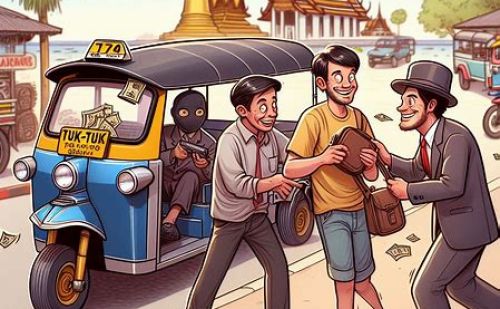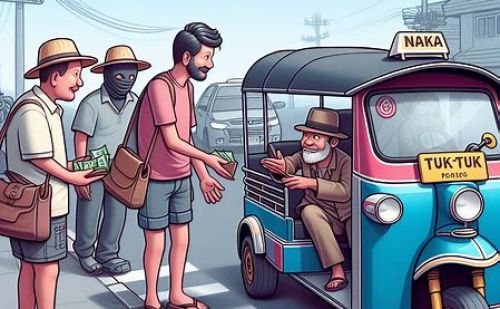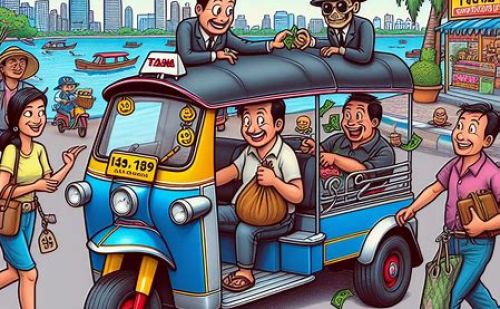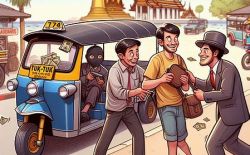Pattaya scams
Pattaya scams
Here are some of the scams that you should be aware of and how to avoid them:
Jet ski scam: Some jet ski rental operators may charge you a high fee for damages that you did not cause. To avoid this, take photos of the jet ski before renting it and make sure the operator signs a paper that acknowledges the existing damages
Adult show scam: Some bars or clubs may offer you a free adult show with a drink, but then charge you a huge bill afterwards. To avoid this, do not accept any invitations for free shows and always pay upfront for your drinks
Pickpocket scam: Some groups of people may approach you on the street or in crowded places and try to distract you while stealing your valuables. To avoid this, be careful of strangers who get too close to you and keep your belongings secure
Changing money scam: Some money changers may try to cheat you by giving you less money than you deserve or by using fake notes. To avoid this, always count your money before leaving the counter and use official banks or ATMs for exchanging money
Bar girl scam: Some bar girls may try to get you to buy them drinks or gifts, but then disappear or ask for more money. To avoid this, do not trust any bar girls who approach you and do not agree to pay for anything in advance
Motorbike scam: Some motorbike rental operators may claim that you have damaged their bike and demand a high fee for repairs. To avoid this, take photos of the bike before renting it and check the contract carefully
Bill padding scam: Some restaurants or bars may add extra items or charges to your bill without your consent. To avoid this, always check your bill carefully and ask for a receipt
Gemstone scam: Some tuk-tuk drivers or tour guides may take you to a gem shop and persuade you to buy fake or overpriced gems. To avoid this, do not follow any recommendations for gem shops and do not buy any gems without proper certification
Bird release scam: Some people may offer you to buy birds to release them for good luck, but then catch them again or charge you a high price. To avoid this, do not participate in this activity and refuse to pay anything
How do I report a scam to the police?
If you are in Thailand, you can report a scam to the police in several ways:
You can call the Tourist Police at 1155. They have experience dealing with tourist scams and can inform you of the proper way to proceed
You can visit the Thai Police Online website and fill in the details of your complaint. The website will forward your case to the appropriate police station and you can check the progress online
You can go to the nearest police station and file a report in person. You may need to bring some documents, such as your passport, bank statements, or receipts, to support your claim.
If you are not in Thailand, you can contact the Thai embassy or consulate in your country and ask for their assistance. They may be able to help you communicate with the Thai authorities or provide you with legal advice.
How can I avoid being scammed while traveling?
That’s a great question. Travel scams are more common than you might think, and they can ruin your trip if you’re not careful. Here are some general tips to avoid being scammed while traveling:
Do your research before you go. Look up common scams in the area you’re visiting, and read up on any travel advisories issued by your home country’s embassy or consulate. It’s essential to have an understanding of the local customs, laws, and practices, which can help you avoid situations that could lead to scams.
Be alert and cautious. Scammers often target tourists because they’re seen as easy targets. They may try to distract you, rush you, or pressure you into making a decision. Don’t let your guard down, and always keep an eye on your belongings. If something seems too good to be true, it probably is.
Use reputable services and providers. Whether it’s booking a hotel, renting a car, or joining a tour, always use reliable and trustworthy websites and operators. Check reviews, ratings, and credentials before you pay. Avoid unofficial or unlicensed taxis, money changers, or guides. Ask your accommodation for recommendations or referrals.
Know your rights and options. If you do encounter a scam, don’t panic or give in. Stay calm and assertive, and try to negotiate or walk away. If you need help, contact the local police, your embassy, or a trusted friend. Keep receipts, contracts, and other documents that can prove your case. Report the scam to the authorities and online platforms to warn other travelers.
What should I do if I'm lost or in danger?
If you’re lost or in danger in Thailand, here are some steps you can take to get help:
Call the local emergency authorities. The number for police is 191, for ambulance and fire is 199, and for tourist police is 1155
Contact the nearest embassy or consulate of your home country. They can provide you with consular assistance, such as issuing emergency passports, contacting your family, or arranging medical care
Enroll in the Smart Traveler Enrollment Program (STEP) if you’re a U.S. citizen or national. This will allow you to receive alerts and updates from the U.S. Department of State, and make it easier for them to locate you in an emergency
Stay calm and alert. Avoid any risky or suspicious situations, and follow the advice of the local authorities. Keep your valuables and documents in a safe place, and do not accept any offers from strangers.
What are some common dangers in Thailand?
Some of the common dangers in Thailand are:
Natural disasters: Thailand is prone to flooding, landslides, drought, earthquakes, tsunamis, heat waves, forest fires, and epidemics. You should check the weather forecast and travel advisories before you go, and follow the instructions of the local authorities in case of an emergency.
Road accidents: Thailand has one of the highest rates of road fatalities in the world, especially for motorbike riders. You should always wear a helmet, drive carefully, and avoid alcohol if you plan to rent a vehicle. You should also be wary of public transport, as it may be overcrowded, poorly maintained, or driven recklessly.
Crime: Thailand is generally a safe country, but petty theft, pickpocketing, and bag snatching are common in tourist areas. You should keep your valuables and documents in a secure place, and be alert of your surroundings. Violent crime, such as mugging, kidnapping, or assault, is rare, but possible, especially in remote areas or at night. You should avoid walking alone, and report any incidents to the police.
Scams: Thailand is notorious for various scams that target tourists, such as the jet ski scam, the adult show scam, the gemstone scam, the bird release scam, and the bill padding scam. You should always be skeptical of any offers that seem too good to be true, and pay upfront for any services or products. You should also avoid unofficial or unlicensed taxis, money changers, or guides, and use reputable websites and operators.
Terrorism: Thailand has experienced some terrorist attacks in the past, mainly in the southern provinces of Pattani, Yala, Narathiwat, and Songkhla, where there is an ongoing insurgency. You should avoid traveling to these areas, and exercise caution in other parts of the country. You should also be aware of the political situation, and avoid any demonstrations or protests that may turn violent.
How can I prepare for an emergency while traveling?
That’s a smart question. Emergencies can happen anytime and anywhere, so it’s important to be prepared for them when you travel. Here are some tips to help you plan ahead and stay safe:
Research your destination: Learn about the local laws, customs, health risks, weather, and security situation of the place you’re visiting. Check the Travel Advisories issued by the U.S. Department of State for any warnings or alerts. You can also read reviews and tips from other travelers on websites like Lonely Planet or The Points Guy.
Enroll in STEP: The Smart Traveler Enrollment Program (STEP) is a free service that allows you to register your trip with the nearest U.S. embassy or consulate. This way, you can receive important safety and security messages, and make it easier for them to locate and assist you in an emergency.
Pack an emergency kit: Have a two-week supply of food, water, and medication for yourself and your travel companions. Don’t forget your pets, if you have any. Your kit should also include your passports, travel documents, cash, local translations, and an electrical converter. If you have any special needs, such as medical devices or baby supplies, make sure to pack them as well.
Have a communication plan: Keep a list of your emergency contacts and share your itinerary with them. Let them know how and when you will contact them during your trip. Phone lines may be affected during a crisis, so think of other ways to communicate, such as social media, email, or messaging apps. You can also follow the U.S. embassy or consulate on Twitter or [Facebook] for updates.
Know your options: If you encounter a crisis, such as a natural disaster, a terrorist attack, or a pandemic, stay calm and follow the instructions of the local authorities. Call the local emergency numbers, such as 191 for police, 199 for ambulance and fire, or 1155 for tourist police. Contact the nearest U.S. embassy or consulate, or call 888-407-4747 or 202-501-4444 for assistance. Have an exit strategy and know how to get out of harm’s way without relying on others.








